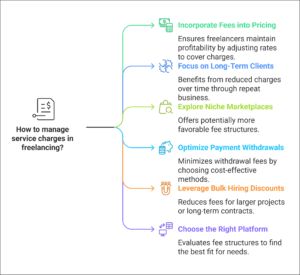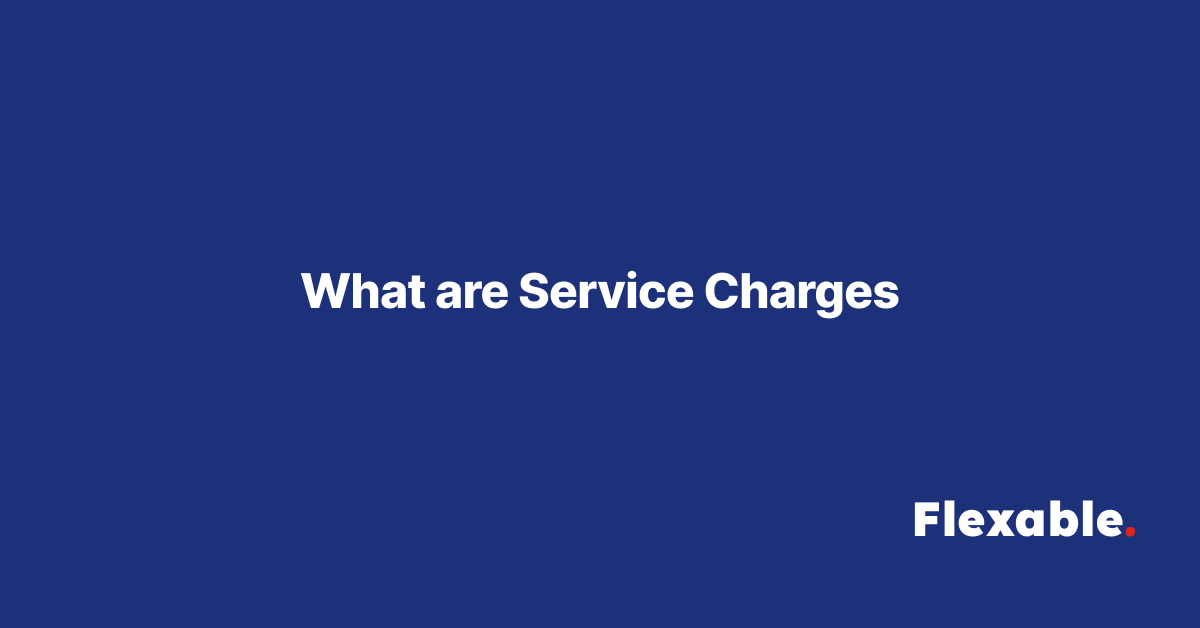Service charges refer to fees or commissions that freelancing platforms or intermediaries deduct for facilitating transactions, providing infrastructure, and ensuring the smooth functioning of the platform. These charges are usually applied to freelancers, clients, or both, and they serve as a primary revenue source for freelancing marketplaces. Understanding service charges is essential for freelancers and clients alike, as it helps in better budgeting, pricing, and managing project costs.
In the freelancing industry, service charges can vary based on factors such as the platform used, the total value of the transaction, or even the type of services provided. While they might seem like a small cost initially, these charges can add up, especially for high value projects or frequent users of freelancing marketplaces.

Why Do Freelancing Platforms Charge Service Fees?
Freelancing platforms provide significant value to both freelancers and clients, and service charges are their way of sustaining operations and generating revenue. Here are some of the key reasons these charges exist:
Platform Maintenance and Development:
Service charges fund the continuous development of the platform, including website updates, app improvements, and user experience enhancements.
Access to a Global Marketplace:
Freelancers gain access to a vast pool of clients, while clients have the convenience of finding skilled professionals in one place.
Secure Payment Systems:
Platforms often use escrow systems to protect freelancers and clients, ensuring that payments are processed fairly and securely.
Dispute Resolution Services:
Many platforms offer built-in dispute resolution mechanisms, helping resolve conflicts professionally and impartially.
Marketing and Visibility:
Service charges support the promotion of the platform, attracting more clients and projects, which benefits freelancers in the long run.
Administrative Costs:
These fees also cover operational costs such as customer support, legal compliance, and fraud prevention.
Types of Service Charges in Freelancing
Freelancing platforms may have different structures and approaches for calculating service charges. Below are some common types:
1. Flat-Rate Charges
Platforms may impose a fixed percentage fee on every transaction, regardless of the project value. For example, a 10% service fee applies to all completed projects.
2. Tiered Fee Structures
Some platforms charge different percentages based on the value of the project or the long-term relationship between the freelancer and the client. For instance:
20% for the first $500 earned with a client.
10% for earnings between $500 and $10,000.
5% for earnings exceeding $10,000 with the same client.
3. Client Fees
While many platforms charge freelancers, some also apply service fees to clients. For example, clients might pay a percentage of the total project cost or a flat fee for posting a job.
4. Withdrawal or Payment Processing Fees
Freelancers might incur additional charges when withdrawing funds to their bank account, PayPal, or other payment systems.
5. Membership Fees
Some platforms offer subscription-based models where freelancers pay monthly or yearly fees for enhanced visibility, access to premium features, or additional proposal credits.
Examples of Service Charges on Popular Platforms
Upwork:
Freelancers pay a tiered service fee:
20% for the first $500 earned with a client.
10% for earnings between $500 and $10,000.
5% for earnings exceeding $10,000 with the same client.
Clients also pay a 3% processing fee for each payment.
Fiverr:
Freelancers pay a flat 20% service fee on all earnings.
Clients do not pay an additional fee, but the project prices are typically higher to account for this cost.
Freelancer.com:
Freelancers pay a 10% fee (or $5, whichever is higher) for fixed-price projects.
Hourly projects also incur a 10% fee.
Clients may pay additional fees for project upgrades, such as featured listings.
How Service Charges Impact Freelancers and Clients
Service charges can have a significant impact on pricing strategies, budgeting, and overall profitability. Here’s how:
For Freelancers:
Earnings Reduction:
Service fees reduce take-home pay, making it essential for freelancers to factor these charges into their pricing.
Pricing Strategies:
Freelancers often increase their rates to compensate for platform fees, which may affect their competitiveness.
Long-Term Client Relationships:
On platforms with tiered fee structures, freelancers benefit from lower fees when working with repeat clients.
Project Size Considerations:
High service charges might discourage freelancers from taking on smaller projects, as the net earnings may not justify the effort.
For Clients:
Increased Project Costs:
Clients may face higher costs due to freelancer rate adjustments or direct client-side fees.
Value for Money:
While service charges increase costs, they often ensure access to vetted talent and secure payment systems, offering peace of mind.
Budget Planning:
Understanding service charges helps clients allocate their project budgets more effectively.
Tips for Managing Service Charges
For Freelancers:
Incorporate Fees into Pricing:
When setting your rates, account for platform fees so you can maintain profitability.
Focus on Long-Term Clients:
On platforms with tiered fees, build strong relationships with clients to benefit from reduced charges over time.
Consider Niche Marketplaces:
Explore platforms that cater to your specific skill set and may offer more favorable fee structures.
Optimize Payment Withdrawals:
To minimize withdrawal fees, choose the most cost-effective method and avoid frequent small transactions.
For Clients:
Leverage Bulk Hiring Discounts:
Some platforms offer reduced fees for long-term contracts or larger projects.
Choose the Right Platform:
Evaluate platforms based on their fee structures and the type of talent you need.
Communicate with Freelancers:
Discuss service fees openly with freelancers and work together to find pricing that satisfies both parties.
Are Service Charges Worth It?
While service charges can seem burdensome, they offer significant value in return. Platforms ensure secure transactions, access to global talent, dispute resolution, and convenience. For freelancers and clients, the time and effort saved often outweigh the costs, making these fees a worthwhile investment in a professional and streamlined experience.
Conclusion
Service charges are an integral part of freelancing marketplaces, enabling these platforms to provide essential services and sustain their operations. By understanding how these charges work and factoring them into your pricing or budget, freelancers and clients can make informed decisions and maximize their use of the platform.
Ultimately, service charges aren’t just a cost, they’re a gateway to secure, efficient, and high quality collaborations in the dynamic freelancing industry. Whether you’re a freelancer seeking your next big project or a client hiring top talent, embracing the value that service charges bring can help you thrive in the ever expanding gig economy.

